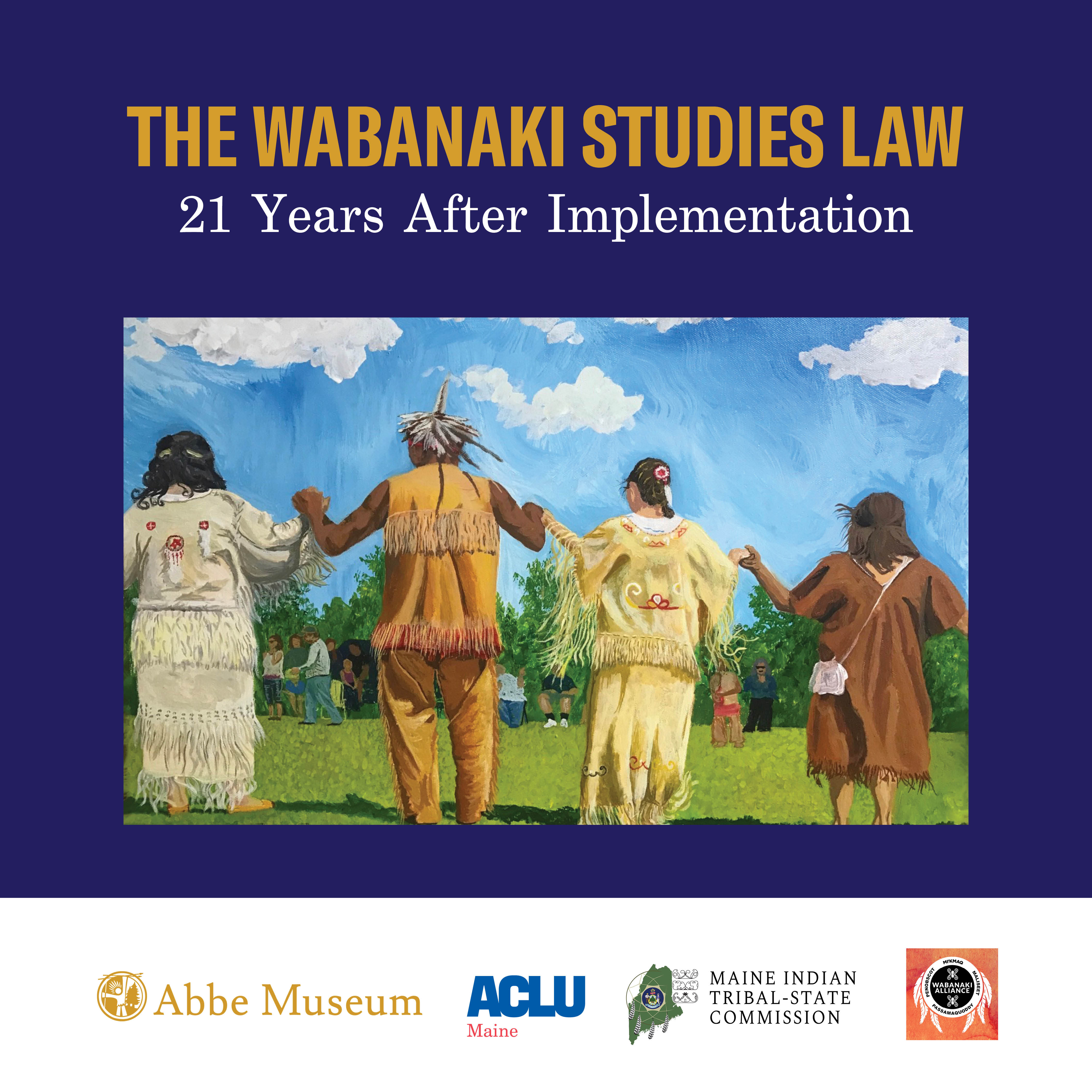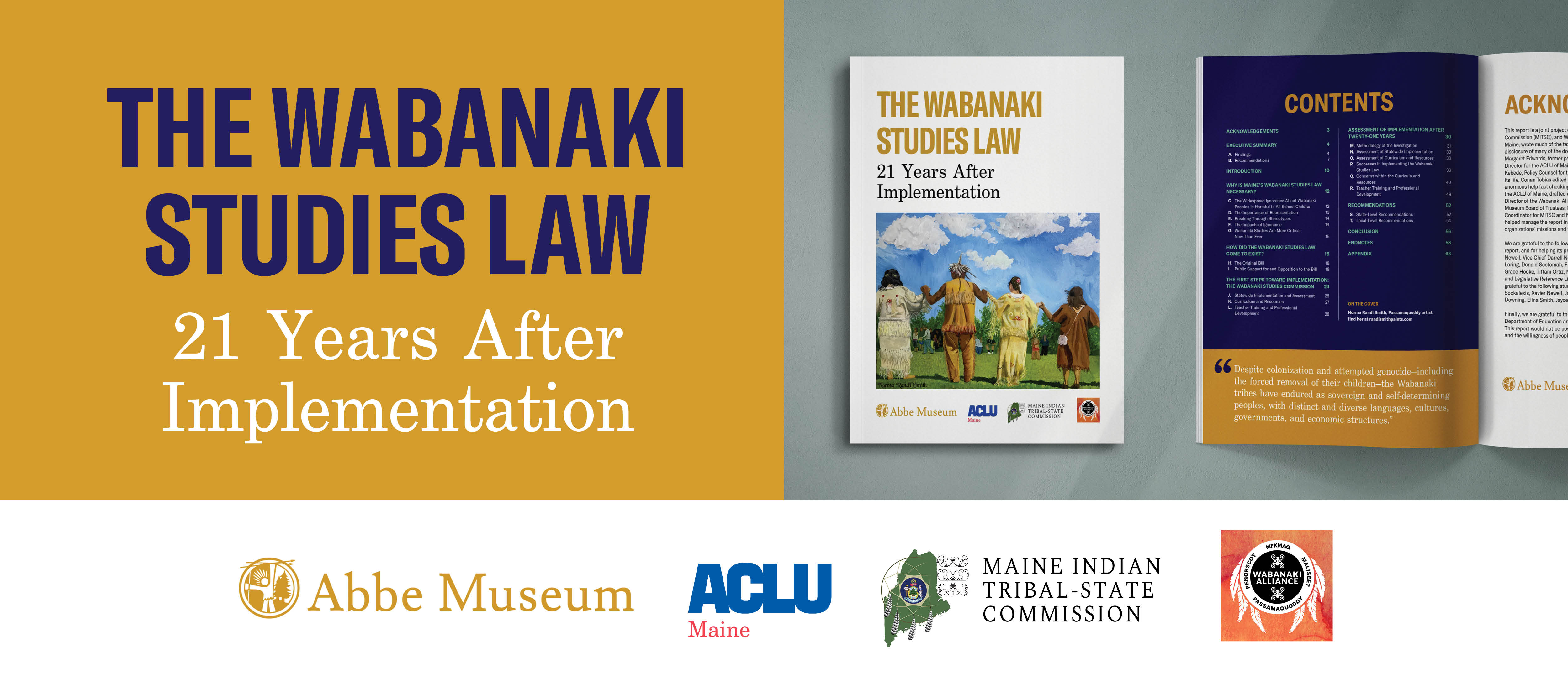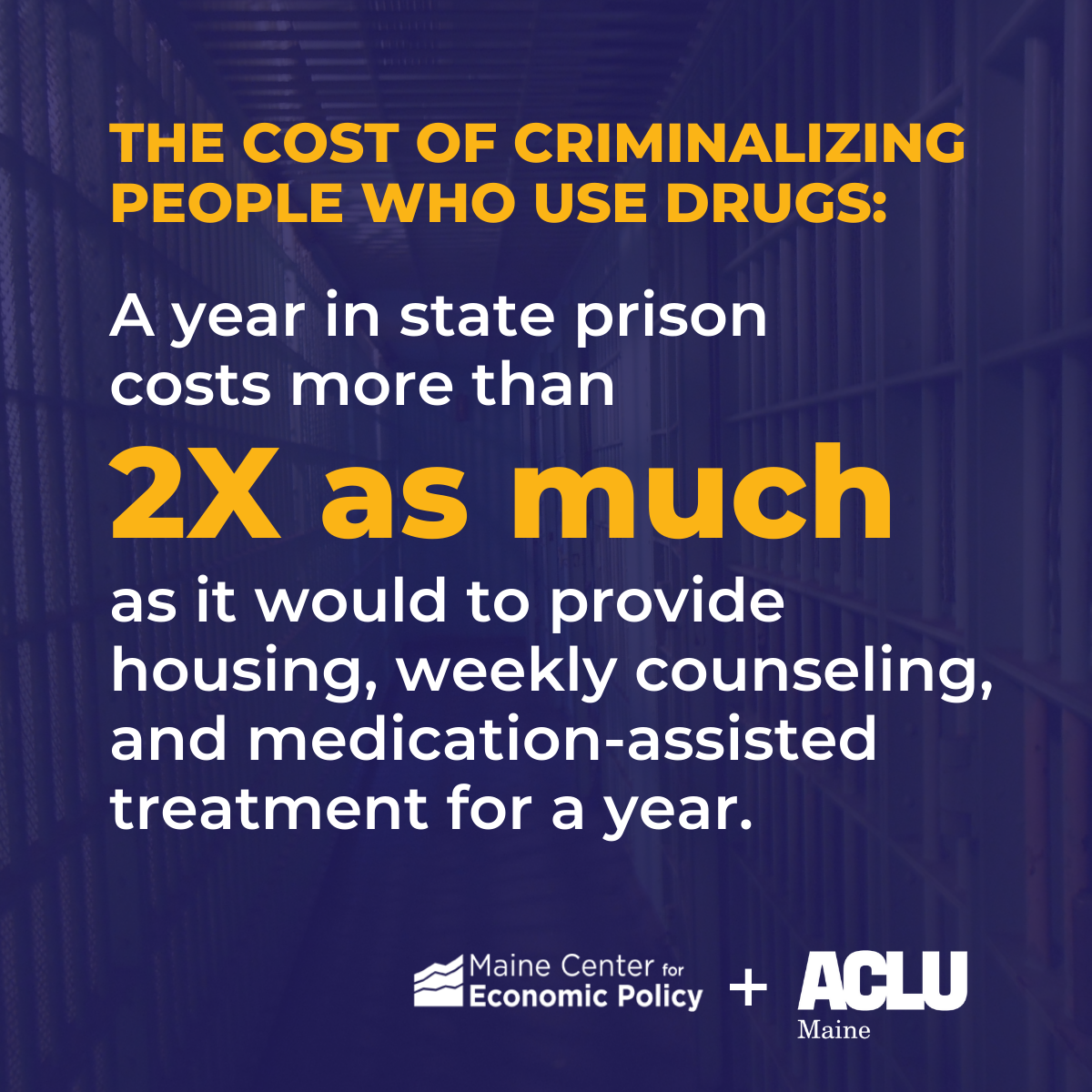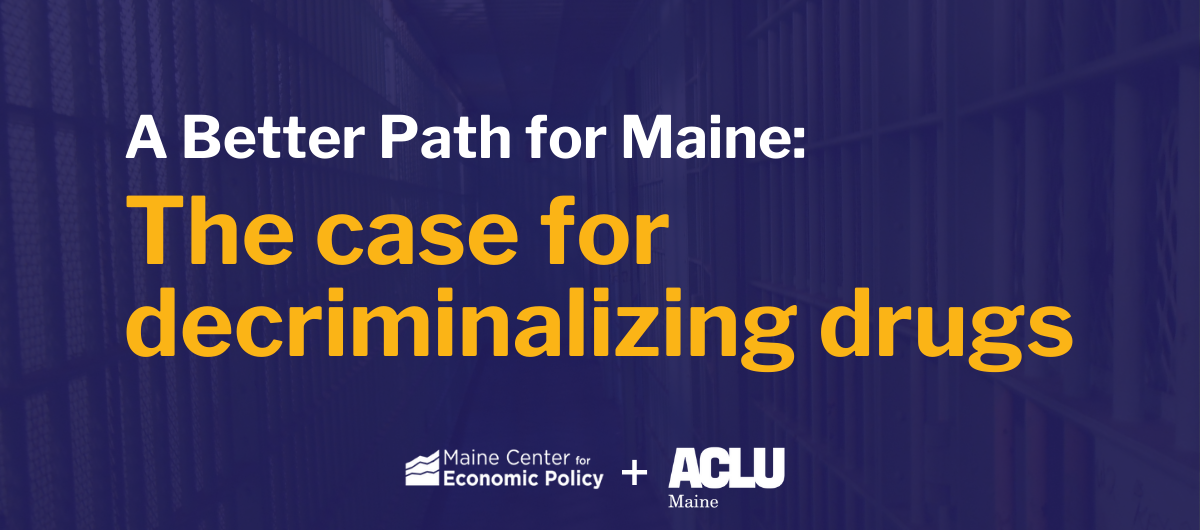The Penobscot Nation, Passamaquoddy Tribe, Mi’kmaq Nation, and Houlton Band of Maliseet Indians (collectively known as the Wabanaki tribes) have lived for thousands of years in the land we now call Maine. Despite colonization and attempted genocide—including the forced removal of their children—the Wabanaki tribes have endured as sovereign and self-determining peoples, with distinct and diverse languages, cultures, governments, and economic structures. A landmark law signed on June 15, 2001, requires schools to teach Maine K–12 students about Wabanaki territories, economic systems, cultural systems, governments, and political systems, as well as the Wabanaki tribes’ relationships with local, state, national, and international governments. This Wabanaki Studies Law, now codified at 20-A M.R.S. § 4706(2), is critical to overcoming stereotypes and ignorance about Indigenous peoples, which are harmful to Wabanaki students and non-Native students alike.
Just over twenty years after its enactment, the ACLU of Maine, the Wabanaki Alliance, and the Abbe Museum undertook to evaluate the successes, challenges, and future of this important law. The purpose of this report is to celebrate the purpose of Wabanaki Studies Law, to assess current implementation of the law, and to urge leaders at all levels of our education system to do more to ensure complete implementation of this important law.
Findings
- The Wabanaki Studies Law is not meaningfully enforced across the state.
- School districts have failed to consistently and appropriately include Wabanaki Studies in their curriculum.
- Teacher training and professional development remain insufficient to equip educators to teach Wabanaki Studies.
Recommendations
- Reinstate the Wabanaki Studies Commission.
- The Department of Education should update the Maine Learning Results with specific learning outcomes for Wabanaki Studies.
- School districts must be held accountable through a review of comprehensive education plans
- Community members should be involved in holding their school districts accountable.
- The Department of Education should work with the newly constituted Wabanaki Studies Commission to create a model curriculum.
- The Department of Education and school administrative districts must support educators with access to materials to teach Wabanaki Studies.
- Wabanaki Studies must be required as part of teacher certification and continuing teacher education.
Those who sponsored, supported, and enacted the Wabanaki Studies Law, and those on the Wabanaki Studies Commission responsible for the first steps in implementing it, were driven by a vision of a more just Maine. That vision is worth acknowledging and celebrating, even as we take the time to observe how far we still must go to realize it. To do justice to these students—and generations of students to come—all stakeholders in our education system must do their part to ensure full implementation of the Wabanaki Studies Law.
Date
Monday, October 10, 2022 - 10:00am
Featured image
Show featured image
Hide banner image
Override default banner image
Documents
Show related content
Tweet Text
[node:title]
Type
Menu parent dynamic listing
Show PDF in viewer on page
Style
Centered single-column (no sidebar)
List Style
Glossary
Show list numbers
Lists
Item subtitle
Maine Native American History Curriculum | Auburn School Department | Received under the Maine Freedom of Access Act
Item subtitle
"Down East to Bangor" Curriculum and Social Studies Lesson Plans | Bangor School Department | Received under the Maine Freedom of Access Act
Item subtitle
Academic Standards for Social Studies and Wabanaki Studies | RSU/MSAD 19 | Received under the Maine Freedom of Access Act
Item subtitle
Social Studies and English Language Arts (ELA) Curriculum | RSU 29 | Received under the Maine Freedom of Access Act
Item subtitle
Native American History Records | Lewiston School Department | Received under the Maine Freedom of Access Act
Item subtitle
Social Studies and Wabanaki Studies Curriculum and Resources for Educators | RSU34 | Received under the Maine Freedom of Access Act
Item subtitle
History/Social Studies Curriculum Guides | MSAD 17 | Received under the Maine Freedom of Access Act
Item subtitle
Social Studies Curriculum, Educator Survey, Educational Events, and Academic Journal, "Finding a Riverview: AntiRacist Education, Decolonization, and the
Development of a District-Wide Wabanaki Studies Curriculum | Received under the Maine Freedom of Access Act
Item subtitle
Social Studies, Native American History, and Wabanaki Studies Curriculum | MSAD1 | Received under the Maine Freedom of Access Act
Glossary title
Document Production
No one should die or have their life derailed because they, or someone they love, uses drugs. But that is what is happening in Maine because of criminalization: There are very real economic and social costs because Maine criminalizes drug use and possession. We talked to more than 150 people — those who have been arrested for drug crimes, their family members as well as prosecutors, defense attorneys, treatment providers, and harm reduction workers.
In these pages, we’ll detail the enormous toll that drug laws take on our communities. Our data is pulled from interviews conducted in person, over the telephone, and on Zoom. We also submitted public records requests and reviewed academic public health research, as well as local and national media stories covering drug policy.
The report illustrates the harm that criminalization does to individuals and their families and how much money the state has spent to do so. Our recommendations will not only help people who use drugs, but will mean wiser investments of public funds.
We hope this report will make a new way in Maine, one that turns away from old systems of punishment and towards an investment in communities and connection.
FINDINGS
Criminalizing people who use drugs has significant adverse economic and social costs. These policy choices make the possibility of a healthy life less likely for people who use drugs.
Of the 38,893 arrests made by Maine law enforcement agencies in 2019, around one in eleven — 3,614 — were for drug-related offenses. These arrests were mostly for low-level offenses. Almost three quarters of drug arrests were made for charges of drug possession. Every year, state and local governments in Maine spend $111 million criminalizing people who use drugs. The impacted individuals themselves then pay another $33 million towards the cost of criminalization and incarceration.
Maine has chosen to prioritize and invest in criminalization of drug use over a public health approach. Increases to spending on treatment were well-outpaced by increases to spending on criminalization. Between 2014 and 2019, inflation-adjusted spending on substance use treatment through the MaineCare system increased 2 percent. However, over the same period, state and local spending on corrections increased 13 percent, while spending on police enforcement increased 14 percent. Maine’s law enforcement spends $8,427 alone for each drug-related arrest. This amount could cover seven months of rent in Cumberland County, two-thirds of the cost of educating a public school student for a whole year, or four months of intensive outpatient treatment for someone on MaineCare.
A year in state prison costs more than twice as much as it would cost to provide housing, weekly counseling and medication-assisted treatment for a year at current MaineCare reimbursement rates. The investment in criminalization is not an effective way to keep people alive and healthy. It achieves the opposite.
Criminalization places lawyers and police in charge of health care decisions. The isolation and disconnection of prison or jail time can interrupt treatment and lead to an increased likelihood of overdose after release. And the criminal records that people get from drug charges means they are forever branded as criminals, making employment, housing and other necessary processes very difficult to get and keep. People who use drugs face stigma because of all this criminal punishment.
Criminalization also compounds racial disparities in our criminal legal system. Enforcement of drug laws is where we see the most dramatic difference between how white people and Black people are treated by the legal system. Black people who use drugs are more than 3.5 times as likely to be arrested for drug possession as white people who used drugs in Maine. The disparities get worse the higher the charge. The tools the legal system uses to keep people from incarceration for drug use — deferred dispositions and drug courts — replicate the harms that criminalization causes. Instead of investing in these avenues, we should look at other places that have created real alternatives, like Portugal and Oregon. These places have used decriminalization initiatives to strengthen public health endeavors and reduce their incarcerated populations.
Maine is ready for this path forward.
RECOMMENDATIONS
Policymakers in Maine can and must turn away from old models that rely on punishment. Instead, they should do the following:
- Decriminalize the use and possession of drugs by completely removing from our laws all criminal punishments for these acts
- Invest in treatment and recovery-related housing
- Invest in public and mental health
- Invest in community connection
- Improve data collection about drug criminalization and make it publicly available
Maine has a once-in-a-generation opportunity to invest in people. The State of Maine is projected to have an unprecedented budget surplus of $1.2 billion dollars over the next two state fiscal years. The federal government has also allocated hundreds of millions more in financial aid to the state and local governments in Maine through the American Rescue Plan Act of 2021. County, municipal and tribal governments in Maine will receive just over $500 billion to assist in economic recovery from the COVID-19 pandemic. Evidence has shown that the COVID-19 pandemic coupled with the economic recession had an outsized impact on people with substance use disorder and 2021 was the worst year yet for drug overdoses in Maine.
Now is the time to turn away from harmful policies and instead invest in our communities.
Date
Monday, March 21, 2022 - 3:00pm
Featured image
Show featured image
Hide banner image
Override default banner image
Documents
Show related content
Tweet Text
[node:title]
Type
Menu parent dynamic listing
Show PDF in viewer on page
Style
Centered single-column (no sidebar)
Show list numbers
Pages



